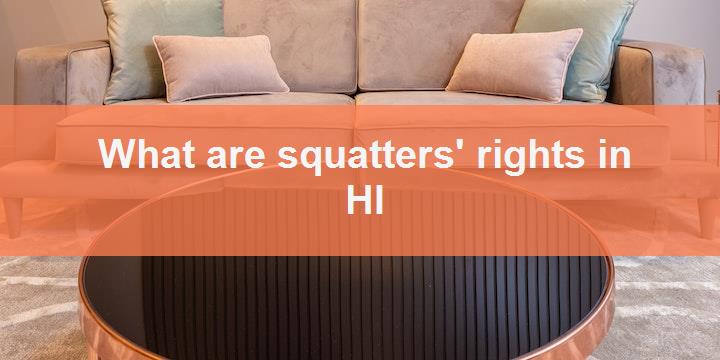Squatting, the act of occupying someone’s property without their authorization or legal right, has been a contentious issue in many states across the United States. In Oklahoma, the laws regarding squatter’s rights are no exception. While some believe that individuals who illegally occupy properties for extended periods of time should be protected under the law, others argue that such laws only serve to encourage unlawful behavior. This article explores the laws surrounding squatter’s rights in Oklahoma, including what defines squatting, what rights, if any, squatters may have, and the legal consequences of this controversial action.
It’s essential to know that Oklahoma doesn’t recognize formal “squatters’ rights.” In other words, there are no laws stating that an individual can acquire a right to someone else’s property after occupying it for a certain amount of time. Nevertheless, some trespass and adverse possession laws may apply in some instances, allowing a person to claim ownership of the land if they have openly lived on it for over fifteen years, paid taxes, and met other legal criteria. It’s also essential to understand that squatting is illegal and can result in criminal charges, such as trespassing and theft, and potential eviction by the property owner.
What is the squatting/squatter?
Squatting is essentially the act of occupying an abandoned or unoccupied property. A squatter is an individual who moves into a property without the legal right to do so. Squatting has been practiced for centuries and over time it has evolved from a form of sheltering the homeless to more of a political statement. Squatters may occupy a range of properties, from abandoned buildings and commercial properties to public spaces such as parks, and sometimes even homes that the squatter may not own. The practice of squatting has been a controversial subject, with both its supporters and detractors airing varying opinions on the appropriateness and legality of the act.
What is an example of a squatter?
A squatter is a person who occupies an abandoned or unoccupied property without the owner’s permission. An example of a squatter is a homeless person who takes shelter in an abandoned building or a couple who moves into an empty house without paying rent or obtaining permission from the owner. Squatters can also be individuals or groups who move into unused land or public spaces and set up makeshift homes, such as tents or shacks. Squatting is illegal in most countries and can often result in evictions or legal action against the occupants. While some people argue that squatting is a way of addressing the issue of homelessness, others view it as a form of trespassing or theft.
What is Adverse possession in Oklahoma?
Adverse possession is a legal term in Oklahoma that refers to the taking of ownership of someone else’s property without permission or payment. It happens when someone continuously and openly uses someone else’s land for a certain period of time, such as making improvements, gardening or mowing the lawn, and paying property taxes. If the landowner does not take legal action to remove them within the statutory period, usually 15 years in Oklahoma, then the adverse possessor can go to court and legally claim ownership of the property. Adverse possession is a complex and contentious issue, and the laws and statutes surrounding it can often be murky and difficult to understand for anyone not familiar with the legal process. It is best to consult a real estate attorney if you feel that your property rights have been affected by adverse possession.
Is it legal to squat in Oklahoma?
It is illegal to squat in Oklahoma. Squatting refers to occupying a property without the owner’s permission, and it is considered to be a form of trespassing. Under Oklahoma law, property owners have the right to protect their property and evict any unauthorized occupants. Squatters could face criminal charges and be subject to fines and potential jail time. It is always best to obtain legal permission before occupying any property, even if it appears to be abandoned or unused. In the event of property disputes, seeking the advice of a professional legal counsel is highly recommended.
Can police remove squatters in Oklahoma?
In Oklahoma, police have the authority to remove squatters from a property, but the process can be time-consuming and requires the property owner to take legal action. If the property owner is not present, the police may require legal paperwork, such as a court order, indicating ownership or permission to remove the squatters. Once the police have established the ownership, they can either warn or arrest the squatters, depending on the severity of the situation. However, it is essential to note that every case is unique, and the laws governing squatters’ eviction can vary depending on the circumstances. It is always best to consult with a legal professional to understand what options are available and the best course of action to remove squatters legally.
How to evict squatter in Oklahoma?
Evicting a squatter in Oklahoma can be a daunting task, but it is not impossible if you follow the right steps. Firstly, you need to make sure that the person you are wishing to evict is actually a squatter and not a tenant. If the squatter has been in the property for less than thirty days, you can serve them with a ten-day notice to leave the premises. However, if they have been living on the property for over thirty days, you would need to file for an eviction lawsuit against them. In order to do so, you would need to provide the squatter with proper notice and then file the lawsuit with the court. Once you have won the case, you can then get a writ of possession from the court that would allow you to physically remove the squatter from your property. It is important to note that evicting a squatter can be a complex and time-consuming process, so it is best to consult with a legal professional to ensure that you are following all the relevant rules and regulations.
FAQ
Q: What are squatters rights in Oklahoma?
A: Squatters rights, also known as adverse possession, allows a person to legally claim ownership of land or property they have been living on and using as their own for a certain period of time.
Q: How long does someone have to live on the land or property in Oklahoma to claim squatters rights?
A: In Oklahoma, the time period is 15 years of continuous, uninterrupted occupancy.
Q: What steps must a person take to claim squatters rights in Oklahoma?
A: The person must openly occupy and use the land, without the owner’s permission, for the full 15 years. They must also pay all property taxes associated with the land for at least 15 years. After the 15 years, the person can file an affidavit in the county where the land is located, and if approved by the court, they will be granted legal ownership.
Q: Can a person claim squatters rights if the land or property is being used for commercial purposes?
A: No, squatters rights can only be claimed on land used for residential purposes.
Q: What happens to the original owner’s rights once squatters rights are claimed?
A: The original owner’s rights are extinguished, and the person claiming squatters rights becomes the legal owner of the land or property.
Q: Can a person sell or transfer ownership of land claimed through squatters rights?
A: Yes, once squatters rights have been legally established, the person can sell or transfer ownership like any other property owner.
Sources
Oklahoma Bar Association
Oklahoma Landlord and Tenant Act
Squatter rights in other states




